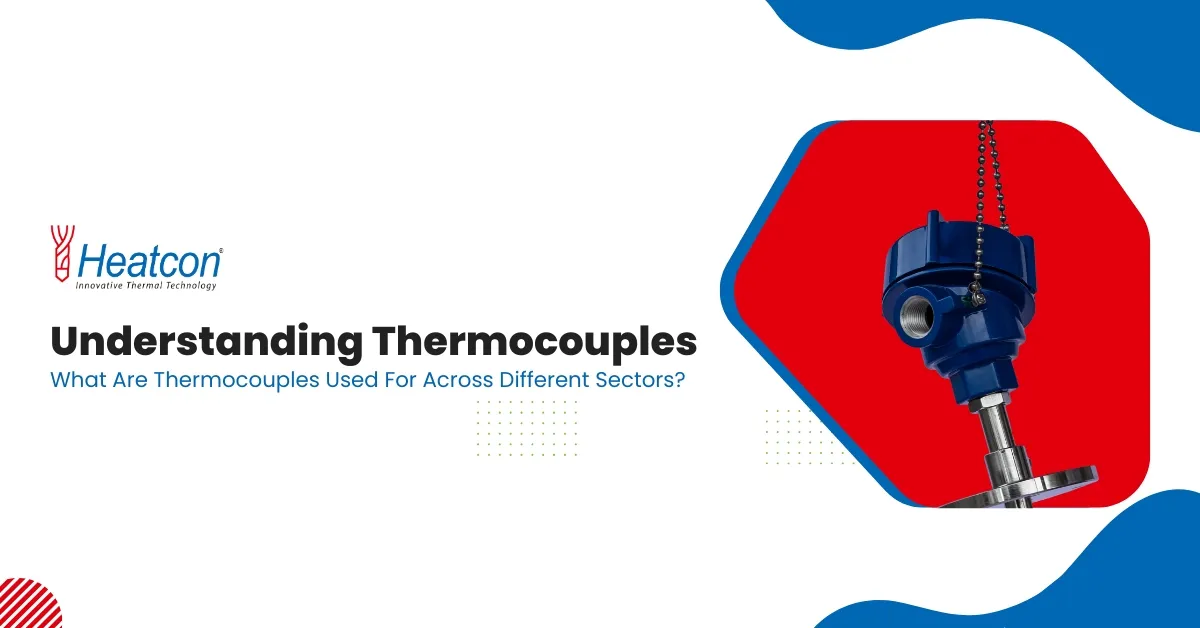Thermocouples Usage
As per MarketsandMarkets report, thermocouples happen to be among the most widely used temperature sensors in a gamut of industries, accounting for a substantial 45 percent share in temperature measurement applications worldwide. Their sturdy design, adaptability to extreme environments, & quick response times make thermocouples the ideal sensors for high-demand applications, from manufacturing & scientific research to energy & food processing. Understanding what are thermocouples used for along with their unique attributes can help you in optimising thermal measurement & control in a number of applications.
What Are Thermocouples Used For?
What are thermocouples used for? Thermocouples tend to serve as an essential thermocouple temperature sensor across a number of industries owing to their capability of measuring temperatures in challenging environments. These temperature sensors tend to be utilised greatly in power generation, metallurgy, automotive, HVAC systems, manufacturing, aerospace, & even everyday household appliances. The versatility of thermocouples lies in their simple yet effective design, which is a pair of different metal wires that have been joined at 1 end. This tends to generate a voltage proportional to temperature. Such a setup tends to enable thermocouples to give accurate & reliable thermocouple temperature measurement over a wide range of temperatures, from cryogenic levels to extreme heat.
Thermocouple Applications
Thermocouples are distinguished by several unique features, which make them ideal for a wide array of applications. They are very much adaptable. These could be found in applications ranging from industrial furnaces to home water heaters. One of the key thermocouple applications is in industrial processes where accurate temperature control is vital. In steel manufacturing, for instance, these sensors are being used for monitoring & controlling temperatures in blast furnaces, ensuring the quality of the final product. In the food industry as well, thermocouples tend to help ensure that food reaches the required temperatures during pasteurization or cooking processes, thus preventing contamination & maintaining safety standards, which are highly essential. Also, thermocouples are crucial in energy production facilities, like power plants, where they help in monitoring the heat levels of turbines, reactors, & boilers, aiding in efficient and safe energy generation. Some more key applications include the following:
- Aerospace: Measuring exhaust gas temperatures in jet engines.
- Automotive: Monitoring engine & exhaust temperatures.
- Scientific Research: Conducting experiments, which need accurate thermal control.
- Oil & Gas: Monitoring temperature in exploration & refining processes.
Thermocouple Temperature Sensor
As a primary temperature sensor, thermocouples tend to be reliable. They give fast responses to temperature variations. This is needed for real-time monitoring in industrial applications.
Types of Thermocouples
Different types of thermocouples cater to varied temperature ranges as well as process environments. Common types include the following:
- Type K: This type is used in general applications, which are suitable for temperatures up to 1,260 degrees Celsius.
- Type J: Suited for temperatures up to 760 degrees Celsius, usually used in vacuum environments.
- Type R & S: Known for stability, ideal for high-temperature applications, like in labs & metallurgy.
Advantages of Thermocouples
There are multiple advantages of thermocouples:
- Wide Temperature Range: Able to measure from -200 degrees Celsius to over 2,000 degrees Celsius, as per the type of thermocouple.
- Durability: Their rugged design can withstand harsh environments.
- Cost-Efficiency: Affordable compared to other temperature sensors, like RTDs.
How Does a Thermocouple Work?
How does a thermocouple work? Thermocouples tend to operate on the principle of the thermoelectric effect, where a voltage is created at the junction of 2 dissimilar metals when there is a temperature difference. This voltage correlates to the temperature & is measured by connecting the other ends of the metals to a sensitive voltmeter.
High Temperature Thermocouples
High temperature thermocouples are designed to function in extreme heat, ideal for applications such as metal processing, glass production, & kilns.
Thermocouple Response Time
The thermocouple response time is quick, allowing it to detect & measure fast temperature variations with minimum delay. This is highly needed in high-speed processes.
Thermocouple Temperature Measurement
Accurate & reliable thermocouple temperature measurement makes such sensors quintessential for accurate temperature monitoring in sensitive applications.
Thermocouple vs RTD Sensor
When comparing thermocouple vs RTD sensor, thermocouples generally provide a broader temperature range & faster response times, making them suitable for dynamic environments.
Why Choose Heatcon Sensors for Your Thermocouple Needs?
For reliable & high-quality thermocouples, Heatcon Sensors tends to offer an extensive selection of temperature sensors tailored to varied industrial & lab settings. Specialising in thermocouple technology, Heatcon Sensors is dedicated to providing accurate, durable, & affordable thermocouple temperature sensors for diverse applications. With an experienced team & a commitment to quality, we ensure that each thermocouple meets rigorous standards of reliability & performance.
Get the Best Products in Town!
Get more information from our team on what are thermocouples used for & discover our comprehensive range of products designed to meet the needs of various industries. Contact us to learn more about our offerings & procure your thermocouple solutions tailored to your specific needs. Whether you are looking for high temperature thermocouples or sensors having specific thermocouple response time characteristics, we have a product range that meets demanding requirements in a gamut of fields.


